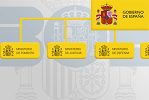Cross-border workers: Taxation
Tax rules applicable to cross-border workers
For the purposes of the double taxation agreements, the expression cross-border workers means workers who have their home near the border in one country, to which they return each day, and are authorised to work as employees in the border area of the other country.
How you are taxed in Spain depends on where you are a resident for tax purposes
-
If you are a resident for tax purposes in Spain, you are liable for Personal Income Tax (Impuesto sobre la Renta de las Personas Físicas – IRPF) and will be taxed on your worldwide income.
-
If you are not a tax resident in Spain, you will pay Non-Resident Income Tax (Impuesto sobre la Renta de no Residentes – IRNR) on income earned in Spain, for example income from work received in Spain.
In both cases, account must be taken of the provisions of the double taxation agreements signed by Spain.
Some double taxation agreements, specifically those signed with France and Portugal, contain specific provisions on cross-border workers which take precedence over the general tax rules relating to income from work. Other agreements, such as those concluded with Andorra or Morocco, do not have specific provisions and therefore the general tax rules apply.
Moreover, non-resident taxpayers who are residents of another Member State of the European Union (EU) or the European Economic Area (EEA) with which there is a regulatory framework on mutual assistance in the exchange of tax information may be entitled to the application of an optional category ( Article 46 of the revised text of the Law on IRNR ) whereby the personal and family circumstances pertaining to the taxation of residents are taken into account in their taxation, as long as they meet certain requirements.
Residence for tax purposes in Spain
Natural persons are considered resident in Spanish territory in any of the following cases:
-
If they spend more than 183 days in Spanish territory in the same calendar year. When determining the amount of time spent in Spanish territory, sporadic absences are counted unless taxpayers can prove that they are resident for tax purposes in another country. In the case of countries or territories classified as non-cooperative jurisdictions, the tax authorities may ask for proof that the taxpayer has spent 183 days in the tax haven during that calendar year.
-
If the main hub or base for their activities or economic interests is located in Spain, directly or indirectly.
-
If the spouse (where not legally separated) and minor children who are dependent on the natural person have their habitual residence in Spain. Evidence to the contrary may be submitted in this third case.
Natural persons of Spanish nationality who provide proof of their new residence for tax purposes in a country or territory considered a non-cooperative jurisdiction retain their status as IRPF taxpayers. This rule shall apply in the tax year in which the change of residence occurs and for the four subsequent tax years.
On the contrary, a natural person will be considered to be non-resident in Spain if they do not meet any of the above requirements.
Residency in two countries
A person may be considered to be resident in two countries where the national legislation of both countries applies. In such cases, the situation will be governed by the convention signed by the two countries, if one exists. Such conventions establish rules to prevent a person being considered resident for tax purposes in both countries. In general, under such rules persons are resident:
-
In the country where they have their permanent home. If they have a permanent home in both countries, they are resident in the country in which they have the closest personal and financial ties.
-
If this cannot be determined, they are resident in the country where they habitually live.
-
If they habitually live in both countries, or in neither, they are resident in the country of which they are a national.
-
If they are a national of both countries, or neither country, the relevant authorities will settle the matter by mutual agreement.
Specific features of the double taxation agreement with France
Cross-border workers who are resident in Spain and travel daily to work in the border area in France: Under the terms of the double taxation agreement signed between Spain and France, wages paid to cross-border workers who are resident in Spain are only taxable in Spain.
Cross-border workers who are resident in France and travel daily to work in the border area in Spain: Under the terms of the double taxation agreement signed between Spain and France, wages paid to cross-border workers who are resident in France are only taxable in France, and are therefore exempt from tax in Spain.
Specific features of the double taxation agreement with Portugal
Under the terms of the double taxation agreement signed between Spain and Portugal, wages paid to cross-border workers who are resident in Spain are only taxable in Spain.
Under the terms of the double taxation agreement signed between Spain and Portugal, wages paid to cross-border workers who are resident in Portugal are only taxable in Portugal, and are therefore exempt from tax in Spain.
Non-residents. Optional category for taxpayers residing in other Member States of the EU or EEA with which there is a regulatory framework on mutual assistance in the exchange of tax information.
Who can request application of this optional category?
IRNR taxpayers:
-
Who are natural persons.
- Who can prove that they are resident in another EU Member State, except residents of countries or territories considered by the regulations to be non-cooperative jurisdictions, or in an EEA Member State with which there is a regulatory framework on mutual assistance in the exchange of tax information.
-
Who can prove that at least 75 per cent of their entire income in the tax period is income from work and economic activity earned during that tax period in Spanish territory, or who can prove that the income earned during the financial year in Spain was below 90 per cent of the minimum personal and family threshold that would have corresponded to them on the basis of their personal and family circumstances had they been resident in Spain, and that the income earned outside of Spain also fell below that threshold.
-
Where this income has actually been taxed under IRNR.
The purpose of this optional category is for actual taxation in Spain to be calculated in accordance with the rules on IRPF, without the person thereby losing their status as IRNR taxpayer.
Once the request has been submitted and compliance with the eligibility conditions has been verified, the tax authorities will, taking into account the entire income obtained by the taxpayer in the tax year and their personal and family circumstances, and according to the IRPF assessment scale, determine the corresponding average tax rate.
The resulting average tax rate will be applied to the part of the taxable amount corresponding to the income obtained in Spanish territory.
If the above results in an amount lower than the amounts paid during the tax period by the non-resident taxpayer as IRNR on income obtained in Spanish territory, the excess will be refunded.
IRPF (personal income tax) returns
How you are taxed depends on where you are resident for tax purposes. The tax year coincides with the calendar year, with no interruption due to a change of residence. Therefore, a natural person is either resident or non-resident for the whole tax year.
The legislation on IRPF governs the circumstances in which you must file a personal income tax return. This must be checked every year as it is subject to amendments.
Use form 100 ![]() to file tax returns. Tax returns and confirmation of the draft tax return can be filed online via the Tax Agency’s website.
to file tax returns. Tax returns and confirmation of the draft tax return can be filed online via the Tax Agency’s website.![]() Taxpayers who meet certain requirements may also confirm and file the draft tax return by telephone or at the Tax Agency's offices, by appointment in both cases.
Taxpayers who meet certain requirements may also confirm and file the draft tax return by telephone or at the Tax Agency's offices, by appointment in both cases.
The deadlines for filing are generally from April to June, although they should be checked every year in case of slight changes. Every year there is an information campaign on personal income tax returns, with a special section on the Tax Office website containing information on all these aspects.
IRNR tax returns in the case of income earned without a permanent establishment
Non-resident taxpayers must file an IRNR self-assessment for income obtained in Spanish territory. However, in general, they do not have to file a tax return for the following income:
-
Income for which tax has been withheld.
-
Income subject to withholding tax but exempt under the provisions of the Spanish Tax Law or an applicable double taxation agreement.
If a tax return has to be filed, form 210![]() must be used. The filing deadline varies depending on the type of income and the outcome of the tax return. It may be filed using the printed form generated from the Tax Office portal
must be used. The filing deadline varies depending on the type of income and the outcome of the tax return. It may be filed using the printed form generated from the Tax Office portal![]() or directly online.
or directly online.
IRNR tax returns in the case of income earned through a permanent establishment
A person is deemed to be carrying out economic activities operating through a permanent establishment in Spanish territory where, for whatever purpose, they have, continuously or habitually, facilities or workplaces of any kind in that territory in which all or some of their activity takes place, or where they act in that territory through an agent authorised to conclude contracts, in the name of and on behalf of the non-resident, who habitually exercises those powers.
In particular, the following are considered to constitute a permanent establishment: places of management, branches, offices, factories, workshops, warehouses, shops or other establishments, mines, oil or gas wells, quarries, agricultural, forestry or livestock operations or any other place of exploration or extraction of natural resources, and construction, installation or assembly works lasting more than 6 months.
Where non-resident taxpayers carry out economic activities in Spain and have the right to invoke the application of a double taxation agreement signed between Spain and their country of residence, the specific article of the agreement defining a permanent establishment should be used to determine if the taxpayer is operating through a permanent establishment.
The form for filing a return is the same as the one used for corporation tax ( form 200![]() ) and the same deadlines apply, but form 206 is used for the payment or refunding of tax and the specific identifier code of the permanent establishments must be used.
) and the same deadlines apply, but form 206 is used for the payment or refunding of tax and the specific identifier code of the permanent establishments must be used.
Appeals and complaints against tax assessments
The activity of the tax authorities is regulated. Tax legislation provides that tax assessments issued by the tax authorities may be challenged by the parties concerned in the event of a disagreement, pursuant to Articles 222 et seq. of the Spanish General Tax Law![]() , and the relevant implementing regulation on administrative review. The statements notifying the result of a tax assessment always state how to appeal and include the relevant deadline.
, and the relevant implementing regulation on administrative review. The statements notifying the result of a tax assessment always state how to appeal and include the relevant deadline.
Anyone wishing to challenge the assessment must choose, within a maximum period of 1 month from the day following the date of notification, between:
-
An administrative appeal, filed in writing and addressed to the authority who issued the assessment, stating the arguments and attaching documents in support of the claims made, or
-
An economic-administrative claim before the corresponding Tax Disputes Board, which is independent of the Tax Office. With this latter option, the appeal will be filed with the authority who issued the assessment, who will forward the appeal to the competent court.
Both appeals may be filed via the Tax Office website![]() , using the digital signature systems permitted.
, using the digital signature systems permitted.
Legal and/or technical references
-
Income from work obtained in Spain by non-residents

-
Taxpayers and residence

-
Questions concerning residence

-
Questions concerning taxation of non-residents

-
Questions concerning taxation in the case of an agreement

-
Point 12 of the Protocol of the Double Taxation Agreement between Spain and France

-
Article 15(4) of the Double Taxation Agreement between Spain and Portugal, on Dependent Personal Services

-
Double taxation agreements signed by Spain

-
Optional category for EU/EEA residents regime with regulations on mutual asistance with exchange of information

-
Tax return for residents (IRPF). Period for filling 2024 tax return. Obligation to file a return, how to do so and deadlines

-
Tax returns for non-residents with a permanent establishment, form 210

-
Tax returns for non-residents without a permanent establishment

-
General Tax Law

-
General Tax Law implementing regulation on administrative review











